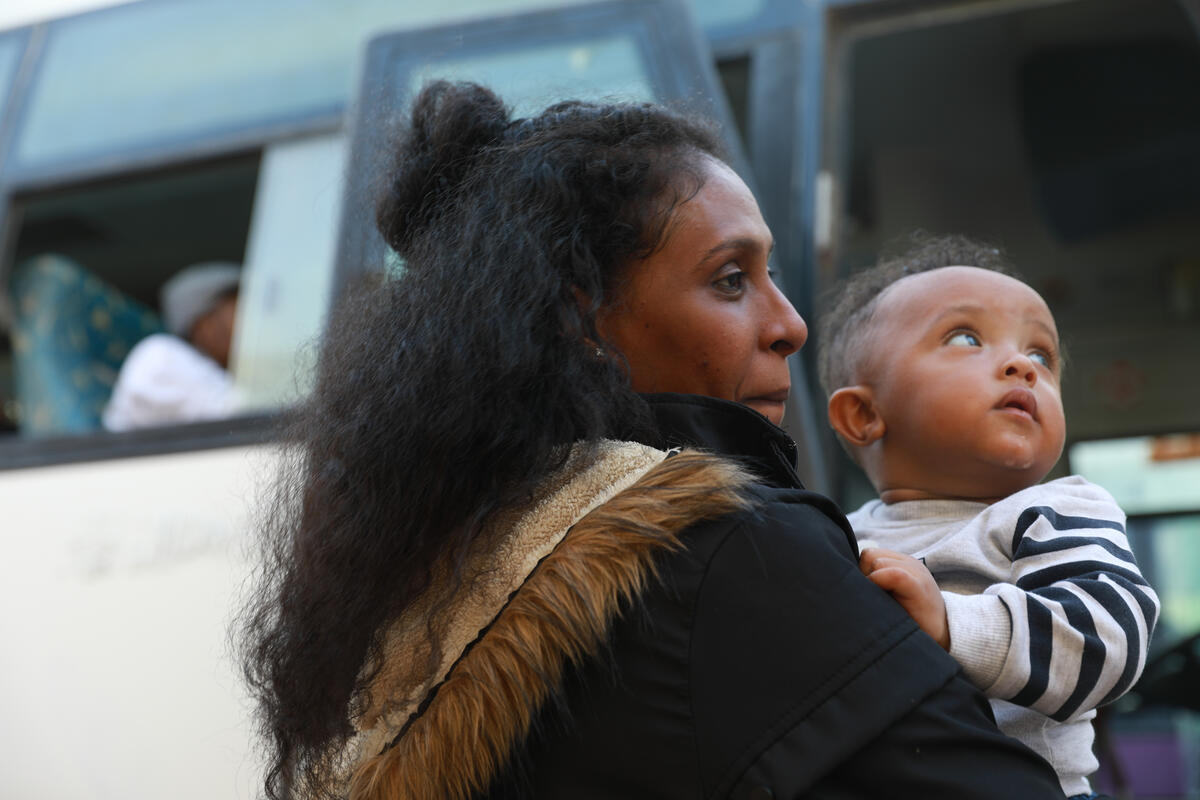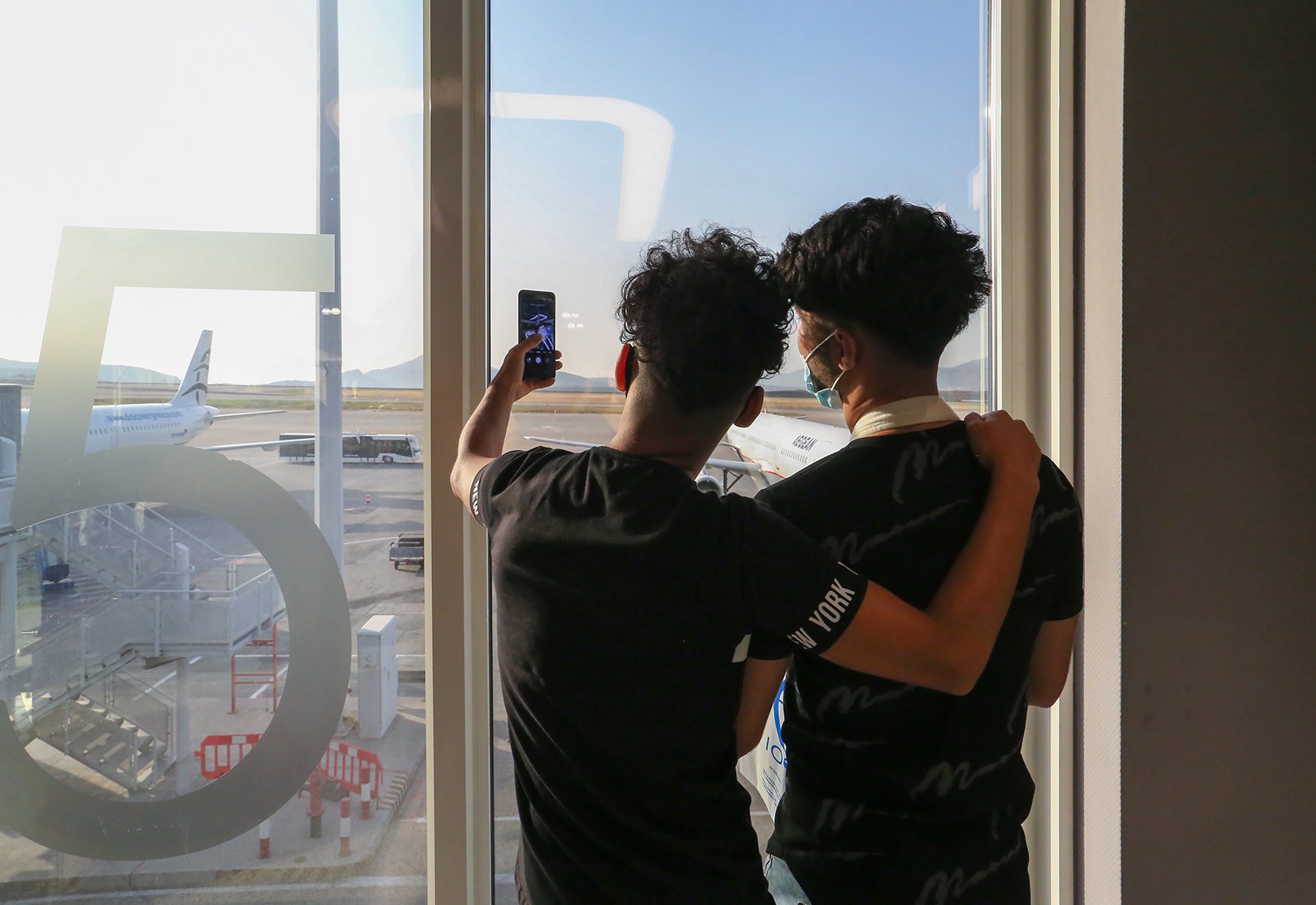UNHCR transfers newly arrived Congolese refugees to camp in Burundi
UNHCR transfers newly arrived Congolese refugees to camp in Burundi

GASORWE, Burundi, 28 November (UNHCR) - The UN refugee agency has transferred around half of a group of more than 400 recently arrived refugees from the Democratic Republic of the Congo (DRC) to an existing camp in northern Burundi, and hopes to move the rest in the next few days.
The refugees say they fled localized fighting between the Congolese army and the Mai Mai militia in the Ruzizi plain, in South Kivu. However, none of them are wounded or suffering major health problems.
When a UNHCR relocation team arrived in Rugombo, to transfer a second group to Gasorwe camp, they found the refugees gathered under a tree with their meagre belongings wrapped into bundles and tied with strips of worn fabric.
UNHCR protection assistant Rose-Medee Dusenge explained to the group that assistance would not be provided near the Congolese border. Generally speaking, the UN refugee agency considers border areas to be too volatile, she told them.
"UNHCR will do its best to rapidly transfer those of you willing to move to Gasorwe camp," she promised. The refugees were unanimous: they all wanted to join the 6,000 inhabitants of the camp, until the fighting and tensions ease in their home area. However, the number of those who could be immediately transferred was limited by the 134 seats available this time round (another 98 people had already been moved several days earlier.
"Widows and elderly go first, followed by people with large families," explained Dusenge. The remaining 43 families - more than 200 individuals - would have to catch the next convoy, planned for the coming week.
Alibata was among those heading to the camp on this convoy. He waited for the departure of the truck with the rest of his family, clutching his six-month baby and smiling with relief. The trip from DRC was harder than he had thought it would be.
"The army started to fight against the Mai Mai," he said. "We heard a lot of gunshots so we fled during the night."
To reach Burundi, Alibata had to cross the Ruzizi river with his children. It is the first time the 27-year-old man has sought asylum in Burundi, but not the first time he had had to abandon his house because of violent clashes nearby - in fact he has had to flee into the Congolese mountains on several occasions in the past.
When the convoy finally reached the camp after several long hours on the road, it was pitch dark - someone recently stole the camp's electric wiring. So the passengers had to use the trucks' headlights to unload themselves and their belongings. Despite this, joyful exclamations pierced the darkness - the refugees had reached the end of a long journey and were reassured to know they would now have a roof over their heads, some food and, above all, a feeling of security.
Many of them were also expecting to meet up with relatives in the camp. "They all know each other. They nearly all come from the Ruzizi plain," said Emmanuel Nahindorera, a UNHCR protection clerk whose work brings him to the camp every day. As he scanned the list, he kept spotting familiar names. Indeed, some of the refugees have lived in Gasorwe camp before, but decided to return to the DRC in recent months, before the new outbreak of fighting.
Phiftine, for example, had lived peacefully back home in Ruvungi with her husband and their five children for more than a year, after venturing back from Gasorwe. Now that she has had to flee again, and is once again back in the camp she repatriated from in July 2004, she has decided she will not risk returning again to the DRC before there is a proper, lasting peace. "I was always scared that my children would either be recruited, or accused of supporting the rebels", she said.
The situation in South Kivu is complex: while refugees are leaving some areas because of fighting, security conditions in other parts of the region - for example in Fizi and Uvira - have recently improved sufficiently to motivate many Congolese refugees to head back home from Tanzania. In order to ensure that they reach their destination safely, UNHCR has begun assisting their return, and is also operating programmes to assist their reintegration.
However, before the newcomers were able to start mixing with the camp's existing residents - who were attracted by the lights and the noise made by the group of new arrivals - Emmanuel Nahindorera lifted a megaphone and reminded them of the bad news: the new refugees will have to spend a week in isolation. Cases of cholera have been reported in the area from where they have come. If any of the newcomers is carrying cholera, it will be identified within a week.
To ensure that the other inhabitants of the camp are not exposed to the infection, the new group will sleep in large sheds during the quarantine period. Then, once this final hurdle has been successfully negotiated, each family will move into a shelter made of red mud-brick, and covered with corrugated iron sheeting. There are not enough empty shelters for all the newcomers, but new ones can be built within ten days.
Despite the disappointment of having to live segregated for another week, the families finish their first evening in the camp in good humour, sharing bread and sardines in the candlelight, before getting ready to sleep.
Burundi hosts as many as 30,000 Congolese refugees. Approximately 8,000 of them live in the two refugees camps of the country. Others have settled in urban areas.
By Catherine-Lune Grayson in Gasorwe Camp, Burundi








